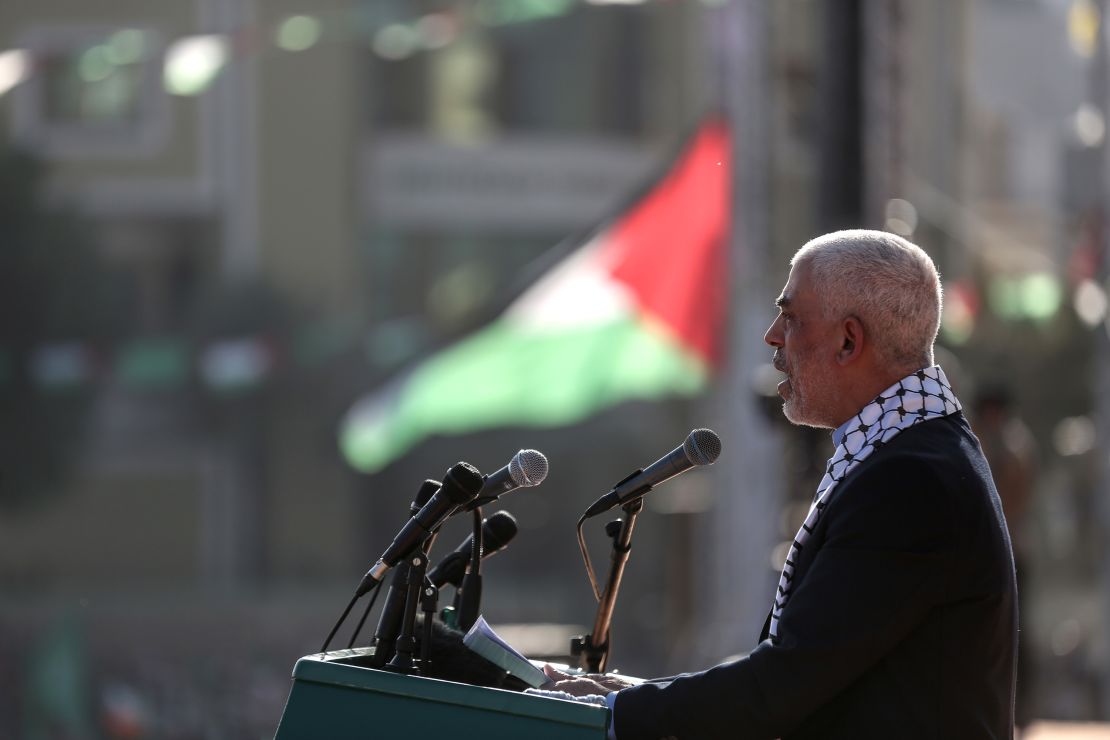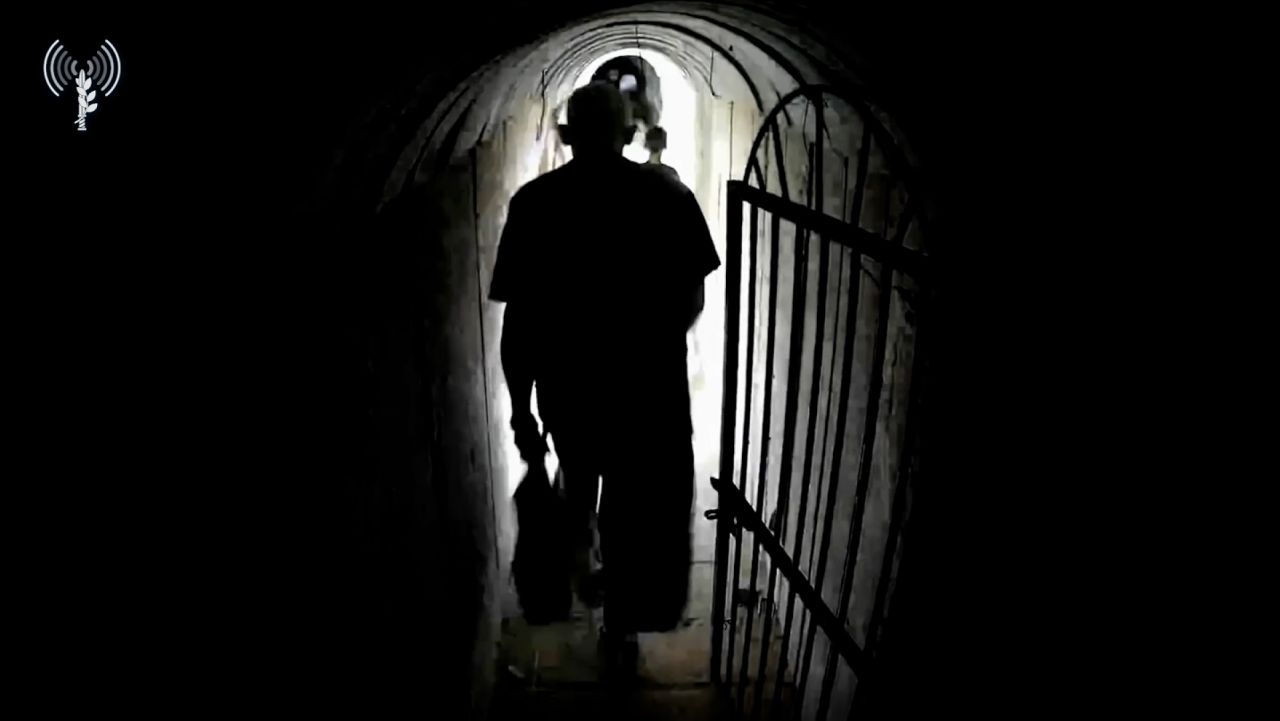Editor’s Note: Peter Bergen is CNN’s national security analyst, a vice president at New America, a professor of practice at Arizona State University and the host of the Audible podcast, “In the Room,” also on?Apple?and?Spotify. He is the author of “The Rise and Fall of Osama bin Laden.” The views expressed in this commentary are his own. Read more?opinion?on CNN.
In February, the Israeli Defense Forces released a?grainy video?showing the back of a man they identified as Yahya Sinwar, Hamas’ leader in Gaza. A dark figure seen only from behind was hurriedly making his way through one of the labyrinths of Hamas tunnels that wend their way deep underground in Gaza.
Since the video didn’t show Sinwar’s face, there was no independent confirmation that the shadowy figure was indeed the Hamas leader.
It’s an apt image for Sinwar, who seems to have vanished like a ghost following Hamas’ attack October 7 attack on Israel, during which some 1,200 people were killed and 250 abducted. The Israeli military quickly asserted that Sinwar was a “dead man walking.” Yet eight months later, Sinwar remains stubbornly alive.

Sinwar has lived much of his life mainly in the shadows, and relatively little is known about him even though he is arguably the most critical player in the Middle East today. Israel accuses Sinwar of being the “mastermind” of Hamas’ attack on October 7.
He is now also calling the shots for Hamas, including whether or not to agree to a ceasefire in Gaza in exchange for a release of Israeli hostages held by Hamas and a release of Palestinian prisoners held by Israel in a?potential deal?that was announced by President Joe Biden at the end of last month.
Meanwhile, Sinwar’s attack on Israel and the ensuing war in Gaza has brought attention to the Palestinian issue in a way that hasn’t been the case for many years.
‘Necessary sacrifices’
Sinwar characterizes the many Palestinians who have lost their lives in the war in Gaza as “necessary sacrifices,” according to?The Wall Street Journal,?which obtained leaked messages from Sinwar to fellow Hamas officials.?“We have the Israelis right where we want them,” Sinwar reportedly said to members of his terrorist group involved in negotiating with the US and Israel.
So, who is Sinwar, aged 61, and what drives him? An answer to that question can be found in an illuminating profile in?The New York Times?of an Israeli prison official, Dr. Yuval Bitton, who got to know Sinwar during the more than two decades that the Hamas leader spent in Israeli prisons. Bitton, a dentist, once helped save Sinwar’s life when he ensured that Sinwar was rushed to a hospital after he became ill with what turned out to be a malignant brain tumor that was successfully operated on.
Following Sinwar’s recovery, Bitton and Sinwar spent many hours talking to each other;??Bitton to better understand the mindset of Hamas and Sinwar to understand better the mindset of the Israelis, of whom he made a careful study, including becoming fluent in Hebrew while he was imprisoned.

Like?Osama bin Laden?before him, Sinwar is a zealot whose opposition to the state of Israel is not so much political as it is religious. Sinwar told Bitton that the land of Israel was, in fact, Muslim land and that Muslims had a religious right to take it back, and as a result, any kind of two-state solution was impossible.
Sinwar also knows the Quran by heart, a prodigious feat of memory since the holy book contains more than?6,000 verses.
Sinwar was in prison for abducting and killing two Israeli soldiers, for which he?received?four life sentences, according to the?US State Department’s?2015 designation of Sinwar as a terrorist.
While he was in prison, Sinwar admitted that he had killed several Palestinians who he believed were collaborating with the Israelis. According to a 1989 interrogation of Sinwar published by the?Israel Hayom newspaper, Sinwar told Israeli interrogators that he strangled one of those collaborators with his?bare hands and used a?keffiyeh?head scarf to suffocate another.
While he was in prison, Sinwar became the?leader?of his fellow Hamas inmates, according to The Washington Post.
Sinwar and the stalled ceasefire negotiations
The proposed ceasefire agreement that Biden publicly laid out at the end of last month has stalled, with US Secretary of State?Antony Blinken?blaming Hamas for the impasse on Tuesday, saying, “I don’t think anyone other than the Hamas leadership in Gaza actually is?the ones who can make decisions.”
It is Sinwar who is central to those decisions, and Blinken even obliquely referred to Sinwar on Tuesday when?he said, “We await the answer from Hamas, and that will speak volumes about what they want, what they’re looking for, who they’re looking after.? Are they looking after one guy who may be pronounced safe, buried — I don’t know — ten stories underground somewhere in Gaza….”
While the details of the ceasefire negotiations are tightly held, there are any number of issues that?Hamas and Israel might differ on, including the length of the first phase of the ceasefire, which Biden had said would last six weeks; the precise role of Israeli troops during that first phase of the ceasefire who Biden said would be withdrawn from Gaza’s population centers, and the exact numbers of Hamas-held hostages to be exchanged for Palestinian prisoners held in Israeli jails.
It must surely weigh heavily on the minds of Israeli negotiators that Sinwar himself was an Israeli prisoner and?was released?with more than 1,000 other prisoners in 2011 in exchange for Gilad Shalit, an Israeli soldier who was being held in Gaza.
Get Our Free Weekly Newsletter
- Sign up for CNN Opinion’s newsletter
- Join us on Twitter and Facebook
Sinwar’s release from prison has since come with both a high cost for Israel and?for the Gazans he purports to represent, some?37,000 of whom?have?died in the war, according to the Gaza Health Ministry.
All of that is to say that Sinwar is a brutal, calculating military leader driven by religious zeal that the Palestinian cause is a righteous one. Negotiating with such a leader will never be easy.



